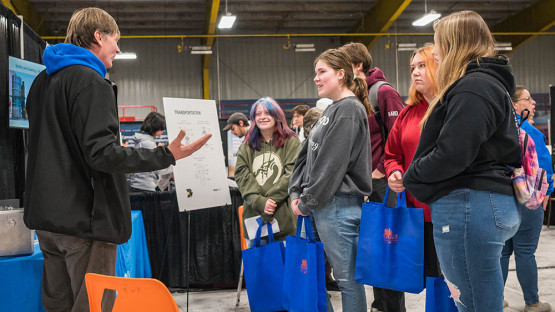
If you would like to learn more about the IAEA’s work, sign up for our weekly updates containing our most important news, multimedia and more.
Working Together to Find a Home for Spent Fuel
Insights from Canada
Matthew Fisher

NWMO staff speaking to members of the public at the Northwest Nuclear Exploration Event in Ignace in 2023. (Photo: NWMO)
After nearly 15 years of work, Canada’s Nuclear Waste Management Organization (NWMO) announced in November 2024 that the Wabigoon Lake Ojibway Nation-Ignace area in northwestern Ontario had been selected as the host community for the country’s deep geological repository for spent nuclear fuel. This major achievement for nuclear power sustainability in Canada was the result of a transparent, dialogue-driven process centred on the needs and concerns of the 22 potential host communities.
Deep geological repositories for the final disposal of spent nuclear fuel are situated hundreds of metres beneath the Earth’s surface. Exhaustive technical assessments are used to determine potentially suitable locations with large rock formations verified to remain stable over many thousands, or even millions, of years. The world’s first deep geological repository for spent nuclear fuel — located in Onkalo, Finland, and described by IAEA Director General Rafael Mariano Grossi as a “game-changer” — is expected to commence operations in 2026 after some two decades of construction.
“Managing spent fuel, whether by recycling it or taking interim steps ultimately leading to final disposal, is crucial for nuclear power programme success,” said Nora Zakaria, Head of the IAEA’s Waste Technology Section. “Technical solutions for the management of spent fuel and radioactive waste have existed for decades, with international collaboration driving progress in geological disposal science. Clear communication and inclusive dialogue are vital for implementation.”
Hosting a nuclear facility of any type is a long term commitment requiring the consent and active engagement of all relevant stakeholders, including community members, local governments and legislators. Canada’s methodology for selecting the site for its deep geological repository included conducting technical assessments of site suitability in parallel with an open dialogue with all the potential host communities. The process was carefully designed to ensure that the site would be safe and secure, hosted by an informed and consenting community, and operated according to robust technical and ethical standards.
“Over the past decade and a half,” said Kim Baigrie, Mayor of Ignace, “our proud community has worked closely with NWMO, its regional stakeholders and most importantly the people of the Township of Ignace to educate ourselves, travel to visit other nuclear sites, dialogue with other nuclear communities, attend conferences and meetings and ensure that we were making an informed decision.”
“Connecting with First Nations and municipalities across northwestern Ontario is an important part of our work,” said Joe Heil, NWMO’s Vice President of Indigenous and Municipal Relations and Transportation. “We’ve spent ten years talking with groups to make sure they had a strong understanding of the safety case regarding the shipping and storage of Canada’s used nuclear fuel. This led to two historic announcements in late 2024, when both the Municipality of Ignace and Wabigoon Lake Ojibway Nation voted in favour of moving forward in the site selection process to be host communities for Canada’s deep geological repository.” He added that detailed impact assessment and environmental assessment processes would need to be completed, including assessments designed by Wabigoon Lake Ojibway Nation, to ensure that the project can be implemented without a detrimental impact on people or the environment.
Community concerns about environmental stewardship and safety, as well as respect for protected areas, were addressed in the site requirements. These included having enough land for all surface and underground facilities; a location outside of protected areas, heritage sites and provincial and national parks; no risk of impacting groundwater resources that could be used for human consumption or agriculture; no natural resources with economic value; and no geological or hydrogeological features that could pose safety risks.
There are more than 600 First Nations communities across Canada, each with a vast wealth of knowledge that NWMO acknowledged as essential to the site selection process. From the beginning, NWMO sought to ensure that First Nations communities’ beliefs and concepts of environmental stewardship were afforded a key role in its decision making. NWMO produced an Indigenous Knowledge Policy to inform its work and provide crucial guidance. The policy underscores the importance of indigenous knowledge and its relevance in decision making, as well as First Nations communities’ special relationship with the natural environment. It also highlights NWMO’s support for the Council of Elders and Youth, an advisory body established by NWMO in 2012 to provide guidance on the application of indigenous knowledge to Canada’s approach to long term spent fuel storage. A previous advisory group, the Elders Forum, had been in place from 2005 to 2012.
Recognizing the unique dynamics of each candidate host community, NWMO published a community wellbeing framework to help ensure that conversations were aligned with specific local and regional concerns. The framework facilitated consideration of how the repository could affect the community’s people, economic activity, infrastructure and physical structures, social and cultural assets and natural environment. With these guidelines established from the outset, constructive dialogue on how the project could impact each community became a hallmark of the site selection process.
“We received an outstanding show of strong support from our community to continue forward with our mandate to be Canada’s first ever site of a deep geological repository for NWMO,” said Baigrie. “We are proud, humbled and excited to move this project forward now with the necessary next steps of licensing and regulation.”
“We look forward to creating a legacy, a journey of economic prosperity for our youth and for generations yet to come,” she added. “It truly is the beginning of our future in Ignace and we stand behind our slogan: ‘solid rock, solid science, solid choice’.”

